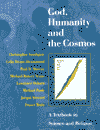The Question of MiracleWe take up this central question in the Christian theology of God’s action by extending our comparison of the two British scientist-theologians Arthur Peacocke and John Polkinghorne (see Peacocke and Polkinghorne compared and Peacocke and Polkinghorne: comparison of models of divine action. Despite the similarities between their views on divine action, Polkinghorne still sticks to his emphasis on the possibility of particular, revelatory divine acts in a way which Peacocke strives to avoid. The first point to make about miracle is that definition is all-important. The 18th-Century philosopher David Hume’s famous attack on miracle can be summarised as follows:
But this approach is based on a premise
which the new science no longer has on offer. As Antony Flew says, (Christians)
‘have to presuppose the existence of a strong natural order.’ A possible definition would be: an
extremely unusual event, unfamiliar in terms of naturalistic explanation, which
a worshipping community takes to be specially revelatory, by dint of the
blessing or healing it conveys, of the divine grace. Polkinghorne has an extensive discussion of
miracle in his Science and Providence
(1989), Peacocke takes a much more cautious view,
questioning ‘whether such direct “intervention” is compatible with and coherent
with other well-founded affirmations concerning the nature of God and of God’s
relation to the world.’
Email
link | Feedback | Contributed by: Dr.
Christopher Southgate |




